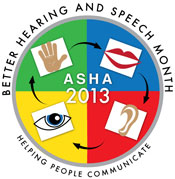 The Boston Marathon and the West, Texas incidents present a perfect opportunity to spotlight trauma induced hearing loss. Following these events, the incidence of acoustic trauma rose, the severity of the injury depending on proximity to the explosions. Medical personnel are treating patients with a range of symptoms: from pain, difficulty hearing higher pitches, and tinnitus to bleeding and perforated/partially missing eardrums. While time will heal some, others will require surgical intervention to repair their wounds. For those who suffered hair cell damage or disruption of the ossicular chain, the hearing loss may be permanent. Just as the Boston amputees are learning to adjust to the loss of their limbs, these victims will need intense support and rehabilitation to deal with their sensory loss.
The Boston Marathon and the West, Texas incidents present a perfect opportunity to spotlight trauma induced hearing loss. Following these events, the incidence of acoustic trauma rose, the severity of the injury depending on proximity to the explosions. Medical personnel are treating patients with a range of symptoms: from pain, difficulty hearing higher pitches, and tinnitus to bleeding and perforated/partially missing eardrums. While time will heal some, others will require surgical intervention to repair their wounds. For those who suffered hair cell damage or disruption of the ossicular chain, the hearing loss may be permanent. Just as the Boston amputees are learning to adjust to the loss of their limbs, these victims will need intense support and rehabilitation to deal with their sensory loss.
The U.S. medical system is sadly well-versed in acoustic trauma and sensorineural hearing loss resulting from loud noises and explosions. The Department of Defense Hearing Center of Excellence estimates that 1.5 million soldiers, and rising, suffer some form of auditory system impairment. To stem the tide, military R & D has focused on improved hearing protection devices that don’t compromise situational awareness. These include custom fitted silicon ear molds with embedded radio communications, and “intelligent filtering” cochlear implants that distinguish between gunfire and vocal commands in combat situations. But, hearing issues are not just physical, they have broad socio-psychological implications for victims. Military and civilian otolaryngologists and SLPs are acutely aware that these issues can lead to depression and social isolation. As a result many now routinely implement a more holistic approach, incorporating and encouraging a strong psychological support network as part of the rehabilitation process.
It is unfortunate that it took two horrific occurrences to raise awareness about this issue. SLPs will undoubtedly play a significant role going forward for these patients. If you want to contribute your talents in the area of hearing loss, contact the Centra Team at 800 535 0076.